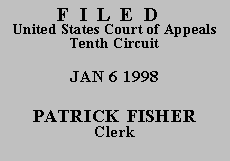

| UNITED STATES OF AMERICA,
v.
DWIGHT ARMSTRONG |
No. 97-3123
(D.C. No. 96-20074-01-KHV) |
Defendant now appeals the denial of his motion for a downward departure. "A discretionary refusal to depart downward is not reviewable by this court unless it appears from the record the sentencing court erroneously believed the Guidelines did not permit a downward departure." United States v. Nelson, 54 F.3d 1540, 1544 (10th Cir. 1995). The sentencing court observed, in denying defendant's motion:
Well, I think that the Government's position is well taken as a matter of law and that a downward departure in these circumstances is not justified.
I think, if anything, I am concerned that the defendant has been nonresponsive to correction in his prior encounters with the legal system and doesn't seem to have taken very seriously any of the past consequences of his encounters with the law. So I am not going to depart downward on that basis because I don't think that the criminal history category of 4 overrepresents his disposition to commit further crimes.
R. Vol. 2 at 8-9.
The above record indicates the sentencing court was aware of its discretionary power to depart downward in fixing Mr. Armstrong's criminal history category and declined to exercise its discretion. Thus, we lack jurisdiction to consider this allegation of error. The district court is AFFIRMED.
The mandate shall issue forthwith.
ENTERED FOR THE COURT
Carlos F. Lucero
Circuit Judge
*.The case is unanimously ordered submitted without oral argument pursuant to Fed. R. App. P. 34(a) and 10th Cir. R. 34.1.9. This order and judgment is not binding precedent, except under the doctrines of law of the case, res judicata, and collateral estoppel. The court generally disfavors the citation of orders and judgments; nevertheless, an order and judgment may be cited under the terms and conditions of 10th Cir. R. 36.3.